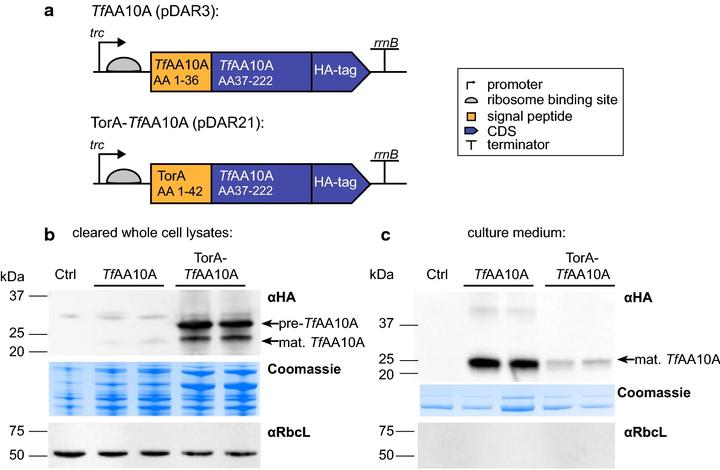Expression and secretion of a lytic polysaccharide monooxygenase by a fast-growing cyanobacterium

Abstract
Background Cyanobacteria have the potential to become next-generation cell factories due to their ability to use CO2, light and inorganic nutrients to produce a range of biomolecules of commercial interest. Synechococcus elongatus UTEX 2973, in particular, is a fast-growing, genetically tractable, cyanobacterium that has garnered attention as a potential biotechnological chassis. To establish this unique strain as a host for heterologous protein production, we aimed to demonstrate expression and secretion of the industrially relevant TfAA10A, a lytic polysaccharide monooxygenase from the Gram-positive bacterium Thermobifida fusca. Results Two variations of TfAA10A were successfully expressed in S. elongatus UTEX 2973: One containing the native N-terminal, Sec-targeted, signal peptide and a second with a Tat-targeted signal peptide from the Escherichia coli trimethylamine-N-oxide reductase (TorA). Although the TorA signal peptide correctly targeted the protein to the plasma membrane, the majority of the TorA-TfAA10A was found unprocessed in the plasma membrane with a small fraction of the mature protein ultimately translocated to the periplasm. The native Sec signal peptide allowed for efficient secretion of TfAA10A into the medium with virtually no protein being found in the cytosol, plasma membrane or periplasm. TfAA10A was demonstrated to be correctly cleaved and active on the model substrate phosphoric acid swollen cellulose. Additionally, expression and secretion only had a minor impact on cell growth. The secretion yield was estimated at 779 ± 40 µg L-1 based on densitometric analysis. To our knowledge, this is the highest secretion yield ever registered in cyanobacteria. Conclusions We have shown for the first time high-titer expression and secretion of an industrially relevant and catalytically active enzyme in S. elongatus UTEX 2973. This proof-of-concept study will be valuable for the development of novel and sustainable applications in the fields of bioremediation and biocatalysis.